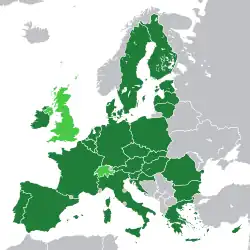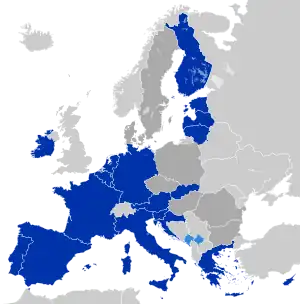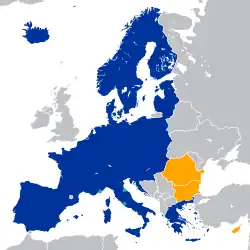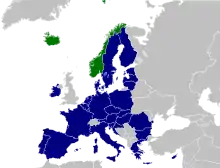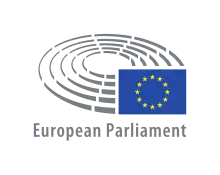| This article is part of a series on |
 |
|---|
|
|
In the European Parliament, the quaestors are elected to oversee administrative and financial matters directly affecting members (MEPs) as well as other duties assigned to them by the Parliament's Rules of Procedure or the Bureau of the European Parliament.[1] Five quaestors are elected among the MEPs for two and a half year-terms, i.e. half a parliamentary term.[2]
Election
Quaestors are elected after the President and Vice-Presidents of the European Parliament.[3] Rule 18 of the Rules of Procedure dictates that quaestors are elected by the same procedure as the Vice-Presidents,[4] meaning that one or more single ballots are held until all five seats have been filled via either absolute majority (first two ballots) or relative majority (3rd ballot).[5] If the number of candidates does not exceed five, the quaestors are elected by acclamation unless a ballot is requested by members or one or more political groups totaling at least one-fifth of the members.[6]
List of quaestors
9th Parliament (2019–2024)
| Name | Country | National party | EP Group | |
|---|---|---|---|---|
| Quaestors serving from 2022 to 2024[7] | ||||
| Anne Sander | Les Républicains | EPP | ||
| Christophe Hansen | Christian Social People's Party | EPP | ||
| Monika Beňová | SMER-SD | S&D | ||
| Fabienne Keller | Agir | RE | ||
| Marcel Kolaja | Czech Pirate Party | Greens/EFA | ||
| Quaestors serving from 2019 to 2022[8] | ||||
| Anne Sander | Les Républicains | EPP | ||
| David Casa | Partit Nazzjonalista | EPP | ||
| Monika Beňová | SMER-SD | S&D | ||
| Gilles Boyer | None | RE | ||
| Karol Karski | Law and Justice | ECR | ||
8th Parliament (2014–2019)
| Name | Country | National party | EP Group | |
|---|---|---|---|---|
| Quaestors serving from 2017 to 2019[9] | ||||
| Élisabeth Morin-Chartier | Union for a Popular Movement | EPP | ||
| Andrey Kovatchev | Citizens for European Development of Bulgaria | EPP | ||
| Catherine Bearder | Liberal Democrats | ALDE | ||
| Vladimír Maňka | SMER-SD | S&D | ||
| Karol Karski | Law and Justice | ECR | ||
| Quaestors serving from 2014 to 2017[10] | ||||
| Élisabeth Morin-Chartier | Union for a Popular Movement | EPP | ||
| Bogusław Liberadzki | Democratic Left Alliance | S&D | ||
| Catherine Bearder | Liberal Democrats | ALDE | ||
| Andrey Kovatchev | GERB | EPP | ||
| Karol Adam Karski | Law and Justice | ECR | ||
7th Parliament (2009–2014)
| Name | Country | National party | EP Group | |
|---|---|---|---|---|
| Quaestors serving from 2012 to 2014[11] | ||||
| Astrid Lulling | Christian Social People's Party | EPP | ||
| Jim Higgins | Fine Gael | EPP | ||
| Lidia Geringer de Oedenberg | Democratic Left Alliance | S&D | ||
| Bogusław Liberadzki | Democratic Left Alliance - Labour Union | S&D | ||
| Jiří Maštálka | Communist Party of Bohemia and Moravia | GUE/NGL | ||
| Quaestors serving from 2009 to 2012[12] | ||||
| Lidia Geringer de Oedenberg | Democratic Left Alliance | S&D | ||
| Jim Higgins | Fine Gael | EPP | ||
| Astrid Lulling | Christian Social People's Party | EPP | ||
| Jiří Maštálka | Communist Party of Bohemia and Moravia | GUE/NGL | ||
| Bill Newton Dunn | Liberal Democrats | ALDE | ||
6th Parliament (2004–2009)
| Name | Country | National party | EP Group | |
|---|---|---|---|---|
| Quaestors serving from 2007 to 2009[13] | ||||
| James Nicholson | Ulster Unionist Party | EPP | ||
| Astrid Lulling | Christian Social People's Party | EPP | ||
| Mia De Vits | Socialist Party Differently | S&D | ||
| Ingo Friedrich | Christian Social Union | EPP | ||
| Szabolcs Fazakas | Hungarian Socialist Party | S&D | ||
| Jan Mulder | People's Party for Freedom and Democracy | ALDE | ||
| Quaestors serving from 2004 to 2007[14] | ||||
| James Nicholson | Ulster Unionist Party | EPP | ||
| Genowefa Grabowska | Social Democracy of Poland | S&D | ||
| Mia De Vits | Socialist Party Differently | S&D | ||
| Godelieve Quisthoudt-Rowohl | Christian Democratic Union | EPP | ||
| Astrid Lulling | Christian Social People's Party | EPP | ||
Footnotes
- ↑ "Rules of Procedure of the European Parliament - Rule 28 - Duties of the Quaestors - December, 2019". www.europarl.europa.eu. Retrieved 2022-01-19.
- ↑ "The political bodies". The political bodies. Retrieved 2022-01-19.
- ↑ "Rules of Procedure of the European Parliament - Rule 15 - Nominations and general provisions - December, 2019". www.europarl.europa.eu. Retrieved 2022-01-19.
- ↑ "Rules of Procedure of the European Parliament - Rule 18 - Election of Quaestors - December, 2019". www.europarl.europa.eu. Retrieved 2022-01-19.
- ↑ "Rules of Procedure of the European Parliament - Rule 17 - Election of Vice-Presidents - December, 2019". www.europarl.europa.eu. Retrieved 2022-01-19.
- ↑ Rule 15(1)(3) read together with Rule 179(1)(c) of the Rules of Procedure (9th parliamentary term) https://www.europarl.europa.eu/doceo/document/RULES-9-2019-07-02-RULE-015_EN.html
- ↑ "Parliament's new Quaestors". europa.eu. 19 January 2022.
- ↑ "EP Quaestors elected, Parliament Bureau complete | News | European Parliament". www.europarl.europa.eu. 2019-04-07. Retrieved 2022-01-19.
- ↑ "Parliament's mid-term election: 14 Vice-Presidents and 5 Quaestors elected | News | European Parliament". www.europarl.europa.eu. 2017-01-18. Retrieved 2022-01-19.
- ↑ "Five Quaestors elected | News | European Parliament". www.europarl.europa.eu. 2014-02-07. Retrieved 2022-01-19.
- ↑ "14 Vice-Presidents and 5 Quaestors of the European Parliament elected". European Parliament. 18 January 2012. Retrieved 8 July 2014.
- ↑ "Five European Parliament Quaestors elected". European Parliament. 15 July 2009. Retrieved 8 July 2014.
- ↑ "Minutes - Election of Quaestors of the European Parliament - Tuesday, 16 January 2007". www.europarl.europa.eu. Retrieved 2022-01-19.
- ↑ "Debates - Election of Quaestors - Wednesday, 21 July 2004". www.europarl.europa.eu. Retrieved 2022-01-19.
